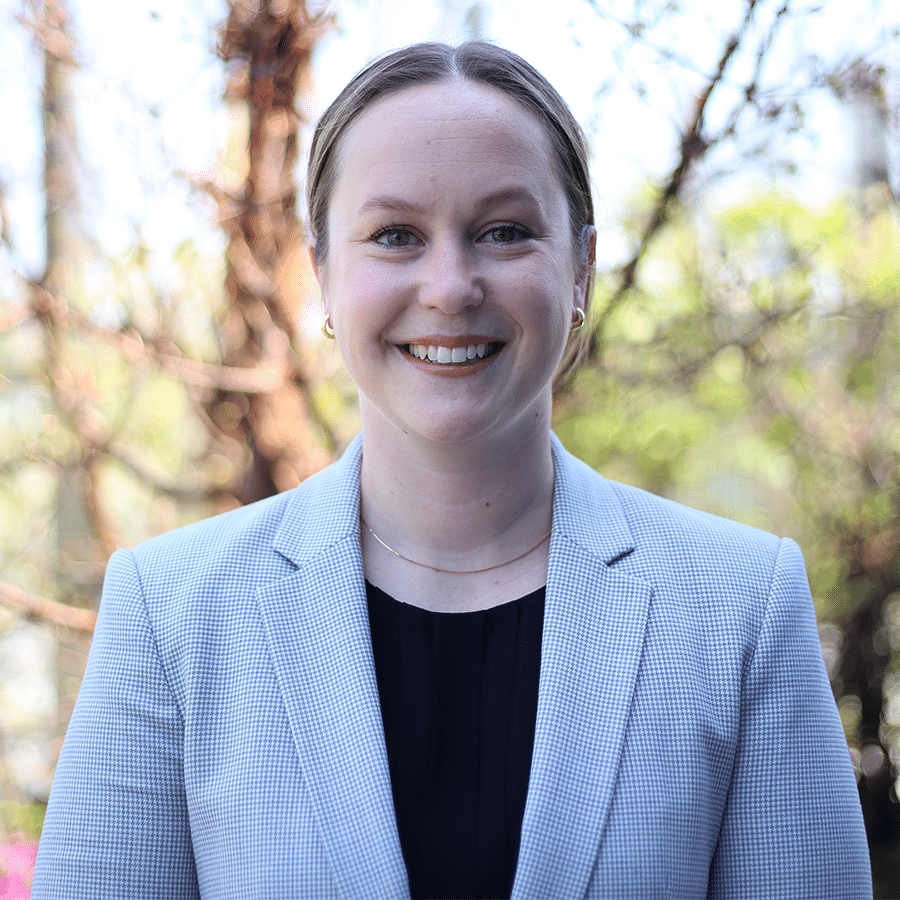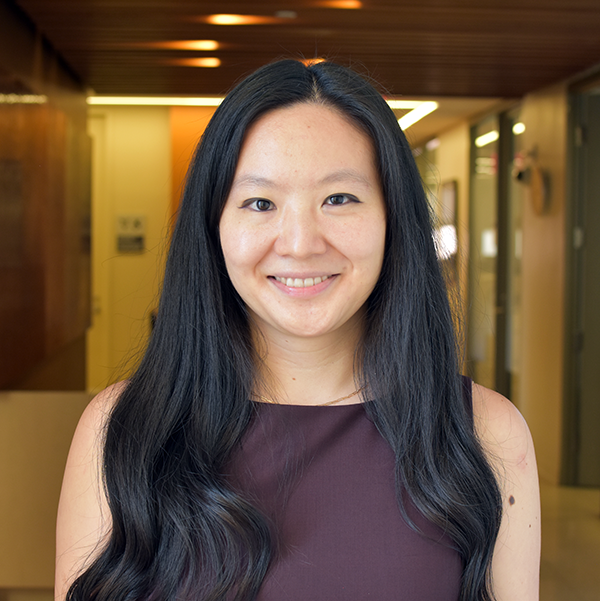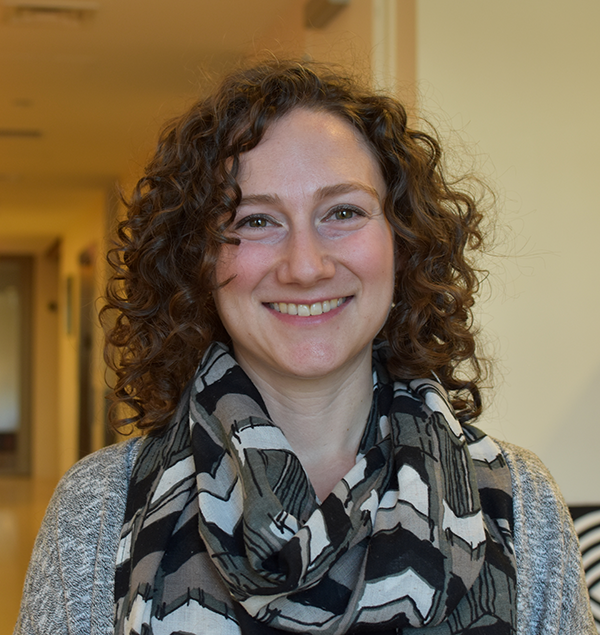Building the future
…of global public health
Current Fellows

DANA BEZUIDENHOUT, MPH
Dana Bezuidenhout (she/hers) is a third-year doctoral student in the Department of Epidemiology and a first-year pre-doctoral fellow in the Global HIV Implementation Science Research Training Fellowship. Her research focuses on tuberculosis (TB) and HIV. Ms. Bezuidenhout recently completed pre-doctoral training in the T32 Social Determinants of HIV training program, where she co-authored four manuscripts focused on HIV counseling and testing platforms for PrEP initiation in South Africa, identification of intervention preferences to support men’s engagement/retention in TB care in South Africa, reasons for missed opportunities to screen and test for TB in health care facilities, and PrEP disclosure and support for young women in South Africa. She has most recently completed a research rotation, where she assisted with the implementation design and data analysis of an R01 trial targeting TB transmission hotspots to find undiagnosed TB in South Africa. She is exploring how spatial mobility shapes TB transmission in South Africa and is conducting an analysis that assesses the effect of diabetes and prediabetes on TB treatment outcomes in a cohort of TB patients in Eswatini. She is also conducting analyses to assess how mobility patterns of cross-border migrant workers whose primary residence is in Lesotho but who work in South Africa affect their HIV outcomes and PrEP use. Ms. Bezuidenhout received a BA in Biology, Society, and the Environment with a certificate in Public Health in 2016 from the University of Minnesota and an MPH in Epidemiology with a certificate in Global Health in 2018 from Columbia University’s Mailman School of Public Health. Her research mentor is Dr. Yael Hirsch-Moverman.

MICHELLE CHANG, MD
Michelle Chang (she/hers) is a second-year infectious disease fellow and second-year post-doctoral fellow in the Global HIV Implementation Science Research Training Fellowship. Chang’s research interest in global health and HIV originated in 2012 when she investigated potential viral factors contributing to Botswana’s false recent rate at the Botswana-Harvard AIDS Institute Partnership lab. Her previous research has explored gaps in HIV prevention and screening in Washington Heights, the utility of procalcitonin in identifying bacterial infections in patients with COVID-19, prolonged SARS-CoV-2 persistence in a solid organ transplant patient, the effect of oral vancomycin on the gut microbiome and gut-derived uremic solutes, and the role of the gut microbiome in the regulation of serum amyloid A. She has also been involved in the ongoing clinical response to the COVID-19 pandemic and the 2022 monkeypox outbreak and provides HIV primary care at the Comprehensive Health Program. . Dr. Chang’s main research project focuses on PrEP as a gateway to vaccine uptake among men who have sex with men. She also explores predictors of missed opportunities for HIV screening, communication regarding HIV among adolescent girls and young women, and prevalence and predictors of asymptomatic sexually transmitted infections in female sex workers in the Dominican Republic. She is currently completing an analysis of data from the Population Health Impact Assessment (PHIA) surveys exploring communication regarding HIV among adolescent girls and young women, as well as an analysis of prevalence and predictors of asymptomatic sexually transmitted infections among female sex workers in the Dominican Republic. Chang completed her BA in Chemistry at Harvard University in 2014, her MD at NYU School of Medicine in 2018, and her Internal Medicine residency at New York-Presbyterian Hospital/Columbia University Irving Medical Center in 2021.

ALEXANDER FURUYA, MPH
Alexander Furuya (he/his) is a first-year doctoral student in the Department of Epidemiology and a first-year pre-doctoral fellow in the Global HIV Implementation Science Research Training Fellowship. His research mentor is Dr. Dustin Duncan. Most recently, Mr. Furuya was a student casual fellow in Dr. Daniel Belsky’s Research Lab at the Robert N. Bulter Columbia Aging Center, where he conducted statistical analyses on longitudinal data to develop a ‘Pace of Aging’ measure utilizing a mixed effects growth model that can be used to identify patients with faster-than-normal pace of aging that could indicate a higher risk of mortality or morbidity. Mr. Furuya’s research project focuses on the effects of incarceration on HIV outcomes among trans-women of color. He is currently analyzing data from the Trying to Understand Relationship, Networks, and Neighborhoods in Trans Women of Color (TURNTT) study. He is also using data from the CHANGE (A Proposal to Cure HCV and Guide Engagement among People Living with HIV) study to assess trends in health care utilization among individuals co-infected with HIV and Hepatitis C. Mr. Furuya received a BA in Journalism, Statistics and Global Health in 2018 from Northwestern University and an MPH in Biostatistics in 2023 from Columbia University’s Mailman School of Public Health.

KAVITHA GANESAN, MPH
Kavitha Ganesan (she/hers) MPH is a fifth-year doctoral student in the Department of Epidemiology and a fourth-year pre-doctoral fellow in the Global HIV Implementation Science Research Training Fellowship. Her research mentor is Dr. Andrea Low. Ms. Ganesan’s research project focuses on characterizing people living with HIV missed in each component of the 90-90-90 care cascade. She has conducted a scoping review that will summarize and synthesize evidence from studies that have examined individual- and population-level characteristics of those who have been left behind the UNAIDS targets in sub-Saharan Africa and their projected impact on HIV incidence. She will work to empirically determine the social, demographic, clinical, and risk behavior correlates for cross-sectional analysis at the individual- and community-level of those left behind in the HIV care cascade in Lesotho using the Lesotho Population-based HIV Impact Assessments (LePHIA). Ms. Ganesan will then predict the HIV epidemic in Lesotho and estimate the percent HIV incidence reduction from 2022-2035 by incremental improvements of each UNAIDS target. In addition to developing her dissertation, she is preparing a manuscript that explores the effect of late diagnosis and advanced HIV disease on transmission potential, for which she has conducted two analyses looking at the prevalence and correlates of two separate outcomes. Recently, Ms. Ganesan submitted a multi-country manuscript on gender differences in clinical characteristics and social barriers to HIV care among people living with HIV for which she collaborated with the Military HIV Research Program. Ms. Ganesan received a BS in Cell Biology and Molecular Genetics from the University of Maryland and an MPH in Epidemiology and Biostatistics from George Washington University.

SNEHA KANNOTH, MPH
Sneha Kannoth (she/hers) is a fifth-year doctoral student in the Department of Epidemiology and a first-year pre-doctoral fellow in the Global HIV Implementation Science Research Training Fellowship. Her research mentor is Dr. Andrea Low, assistant professor of epidemiology at the Mailman School of Public Health. Ms. Kannoth recently completed pre-doctoral training in the NIEHS T32 Environmental Health and Data Science training program and has published ten manuscripts, including three first authored, which focused on topics such as neighborhood environmental vulnerability and pediatric asthma morbidity in the US, associations between early COVID-19 testing capacity and later mortality outcomes, the effect of ageism on the health of older persons, and the amplification of ageism on the cost and prevalence of health conditions. She is currently completing a research assistantship in the Department of Epidemiology at Columbia University’s Mailman School of Public Health with Dr. Jeanette Stingone, assessing the relationship between air pollution exposure, neighborhood-level vulnerability to environmental exposures, and COVID-19 mortality/morbidity. Ms. Kannoth’s research project focuses on HIV outcomes and care among migrant populations in Zimbabwe. She is looking at the association between migrant status and viral suppression among migrants living with HIV. Ms. Kannoth is currently working with her mentor on developing a directed acyclic graph for the project and exploring whether health behaviors, such as PrEP and ART use, are potential effect modifiers in the relationship between migrant status and HIV outcomes. Ms. Kannoth received a BS in Neuroscience in 2016 from Carnegie Mellon University and an MPH in Chronic Disease Epidemiology in 2018 from Yale University.

ELISE MARA, MPH
Elise Mara (she/hers) is a first-year doctoral student in the Department of Epidemiology and a first-year pre-doctoral fellow in the Global HIV Implementation Science Research Training Fellowship. Her research mentor is Dr. Mary Ann Chiasson. Ms. Mara most recently worked for the San Francisco Department of Public Health as an HIV Surveillance Epidemiologist. There, she designed, evaluated, and completed a project to unify and modernize the electronic laboratory reporting workflow, making HIV test result data more complete, timely, and accessible to department outreach efforts. She also responded to surveillance and research requests, such as examining the impact of the COVID-19 pandemic on HIV testing, assessing COVID-19 and mpox positivity and severity among San Francisco residents living with HIV, and exploring the outcomes of HIV care navigation clients in relation to their demographic characteristics. Ms. Mara’s main research project will assess patterns and correlates of retention in HIV care, specifically disengagement and re-engagement along the care cascade, among various population subgroups enrolled in PEPFAR-supported programs in sub-Saharan Africa. Additionally, Ms. Mara is planning an analysis of PrEP change score data from Dr. Susie Hoffman’s R34 project, which piloted an intervention called “Masibambane (“Let’s work together”) – Ladies Chat” that included a PrEP information-motivation workshop for young South African women. Ms. Mara will utilize Markov chain modeling to explore trajectories of the PrEP stage-of-change score that was measured pre-intervention, post-intervention, and at 3-months follow-up in relation to previous scores and when stratified by demographic variables. Ms. Mara received a BS in Biological Sciences with a Pre-Medical certificate in 2014 from the University of Michigan-Dearborn and an MPH in Epidemiological Methods and Applications in 2016 from the University of Michigan.

SARA WALLACH, MPH
Sara Wallach (she/hers), MPH, is a second-year doctoral student in Columbia’s Department of Epidemiology Program and a second-year pre-doctoral fellow in the Global HIV Implementation Science Research Training Fellowship. Her research mentor is Dr. Matthew Lamb. Ms. Wallach’s research project focuses on HIV prevention through recency testing, difference in difference methodology, and the use of the synthetic control method to assess programmatic effectiveness using routinely collected data. Ms. Wallach is utilizing the synthetic control method to quantify the impact of HIV recency surveillance on HIV testing among index contacts and facility-level PrEP uptake using programmatic data from Eswatini. She is also conducting an analysis of PrEP knowledge and attitudes in Zimbabwe, as well as a multi-country analysis of unmet PrEP need, using data from the Population-based HIV Impact Assessment project. Ms. Wallach previously worked for the New Jersey Department of Health managing the state’s “ending the HIV epidemic” efforts, PrEP and syringe access programs, and transitional housing programs for persons living with HIV. Her research has included analyses of Population-based Impact Assessment data and the creation and analyses of cross-sectional surveys on experiences of LGBTQ+ conversion therapy and COVID-19 in marginalized populations. Ms. Wallach received her MPH from the Johns Hopkins Bloomberg School of Public Health in 2020 with a certificate in Evaluation: International Health Programs.
Testimonials
“The training fellowship exposes you to cutting-edge implementation science research and researchers.”
The diversity of exposure through the weekly didactic sessions is such a unique opportunity to learn about the career paths and research of leaders in the field from across institutions.”
“I felt very supported in my mentor/mentee relationship and I was given formative opportunities to engage with diverse research teams.”
“A highlight of the fellowship was how the faculty-fellow seminars made me reevaluate how I though about my work—even when at first glance I did not think there was any direct connection between the two.”



